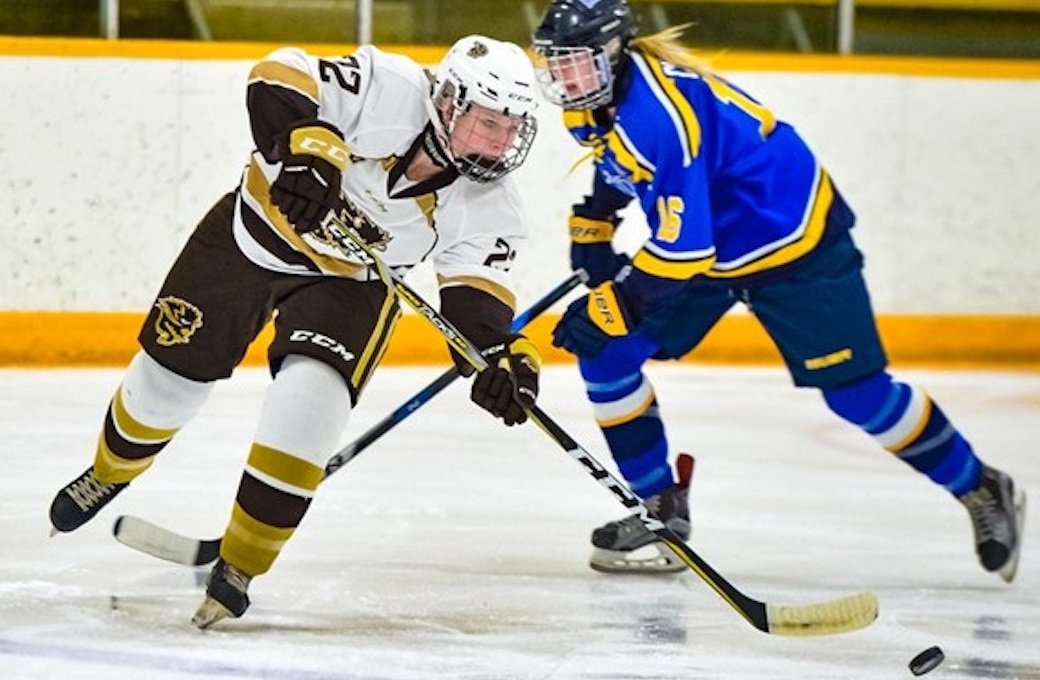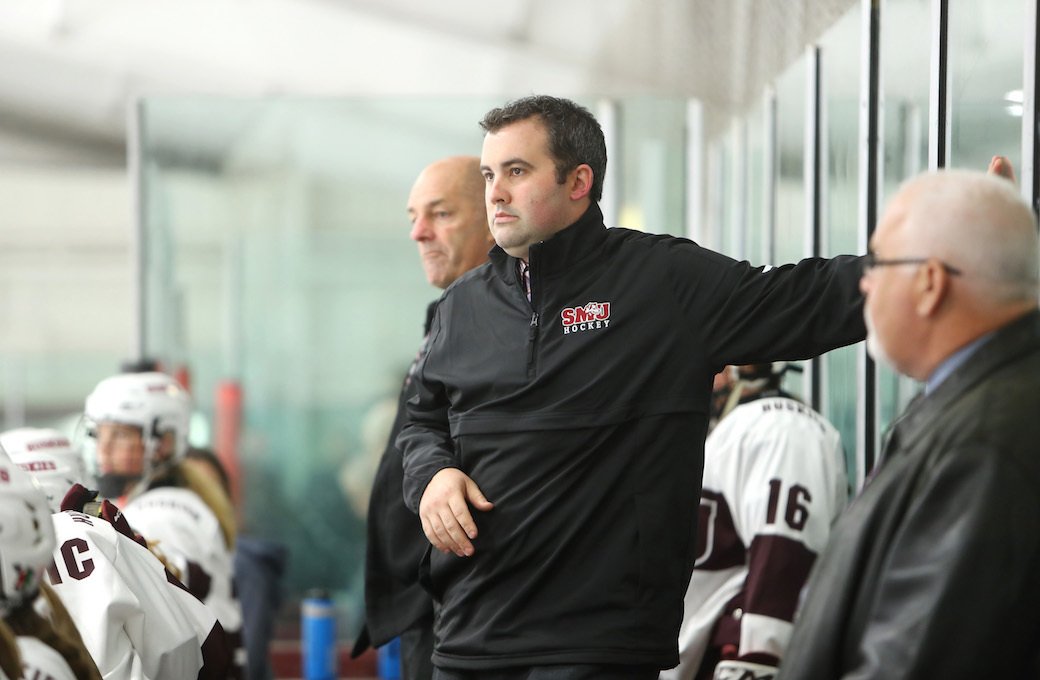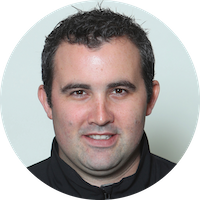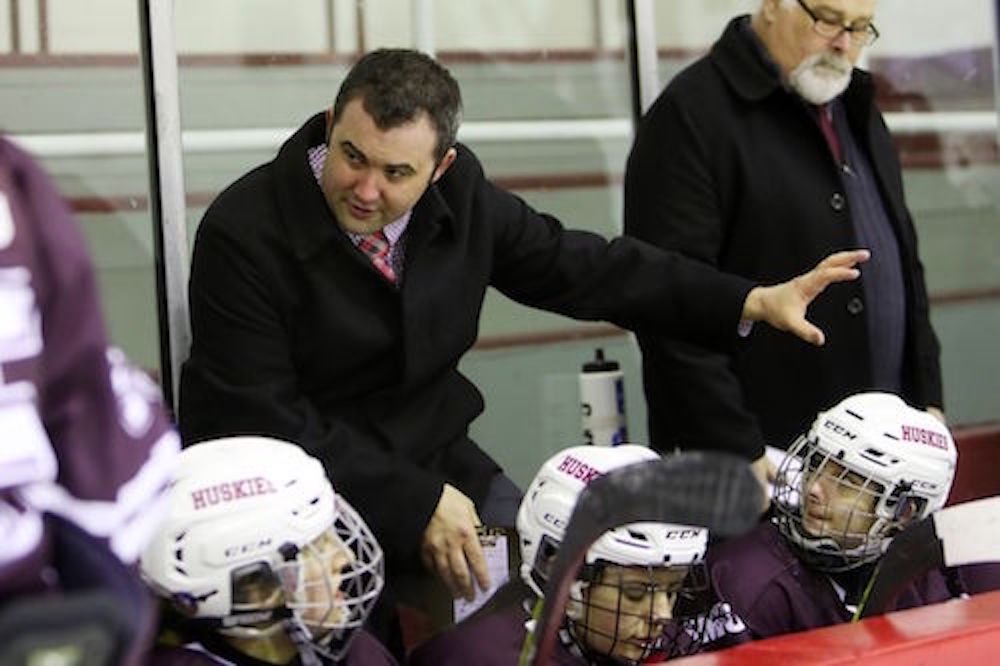Women’s Hockey
TOP 10 TUESDAY: Manitoba earns first No.1 ranking in women’s hockey history


U SPORTS Staff

Throughout the 2017-18 season, U SPORTS sits down with one key athlete, coach, and staff member of each U SPORTS athletic program in our new interview series “Getting to know…”
 Name: Chris Larade
Name: Chris Larade
School: Saint Mary’s University
Sport: Women’s hockey
Position: Head coach
Seniority: Seventh season
Hometown: Cheticamp, N.S.
1. How did you first get involved in coaching? What was your path to your position as head coach of Saint Mary’s women’s hockey?
I got involved as early as grade 11 back in high school with the local Timbits program and some power skating instruction. After a few years off, I then got involved in my last few years at university at the peewee and bantam level on the boys’ side. My last boys’ team had three girls that I really enjoyed coaching and my future wife, who was playing women’s varisty hockey at the time, encouraged me to get involved on the female side of things at the branch level with Hockey Nova Scotia.
I spent a year with the StFX women’s program and then upon graduating with my bachelor of education, took a head coaching position with the female Metro Boston Pizza midget AAA program of the NSFMHL, and spent thre seasons with that program. After that, along with numerous years involved at the branch level and Canada Games, the position opened up here at SMU and I jumped at it, transferring over from the teaching profession.

2. Who are the people that have influenced you most as a coach?
I don’t know that I could pinpoint any individual in particular. Lots of people have helped mold me into the coach I am today. I think it’s more about taking (or stealing) bits and pieces of people you work with and work under. I also read a lot and spend time studying and looking at what NHL coaches do and that type of thing. I think the books have more influence on me than anything.
3. How would you describe your coaching style?
I would say (and hope my players agree) that I am a very demanding coach that expects everyone’s best every day. I strive to have a good mix of fun and work, and really try to combine the two whenever possible. I know I can be tough to please or impress, but my players and their development both on and off the ice, mean the world to me and I just try my best to help them in all those aspects. My goal is to get everything I can out of them and help them realize how truly great they can be.
@SMUHuskies women’s hockey with some early Tuesday morning off-ice work. These girls aren’t normal. #makeeverydaymatter pic.twitter.com/Kgp40DrmyF
— Chris Larade (@chrislarade) November 28, 2017
4. Which coach do you admire the most, and why?
A couple come to mind for sure, and I guess it’s no coincidence seeing how their teams are doing this year. I’m the farthest thing from a Leafs fan but Mike Babcock is a great model as far as how to approach life, your job as a coach/player, and the game every day. He’s got a great perspective on things and his expectations for his team are high.
The other would be John Cooper of the Tampa Bay Lightning. He seems to have a great grasp on what his players are capable of and he truly seems to enjoy his job every day, something I’m sure trickles down to his players.
5. What is the most “out-of-the-box” thing you’ve done as a coach?
Our girls might say I’m rarely “in the box.”
I think I would have to go back to my first year here at SMU. We were very much in a rebuild mode and sitting at something like 1-17-1 in late January. The girls were in the dressing room on a Tuesday morning for practice and I sent our captain in to tell them to take their gear off. I then proceeded to tell them we were going bowling. To me, there was no sense in spending an hour harping on the same things on the ice. I just wanted the players to get their mind off things for a bit and have some fun together.
Turns out we were no better at bowling!
6. What is your greatest coaching moment or achievement?
I am proud of being a back-to-back recipient of the U SPORTS Coach of the Year award the last couple of seasons, simply because that’s purely a reflection of the teams and people I’ve had here playing for me.
To me there’s no such thing as an individual award, and a coach’s award is the best example of it. That said, our national bronze medal in 2016 is undoubtedly at the top, because to me, that was just four years removed from our 1-22-1 season and it was really a culmination of all the girls that stuck it out and made an impact on our program.
"We were 'US'".....These girls are something else! Desire, discipline and a whole lot of character. #auschamps #smuhuskies #d2 pic.twitter.com/rQVpVq2BmQ
— Chris Larade (@chrislarade) March 8, 2017
7. What’s the best advice you can give to an athlete and/or athlete’s parents?
I think for players, it would be a combination of two things:
One, watch the best players in the world as much as you can and learn everything you can in terms of how to approach the game, prepare and compete every day for what you want.
Secondly, be honest with yourself and disciplined in the choices you make on a day-to-day basis, as they all have an impact on your development. You can’t expect the best results without putting in your best effort during preparation.
For parents it’s easy: let the kids play…everything. People get so caught up in comparisons, and camps, and this year-round hockey stuff. It’s crazy. In order to be a good hockey player today, you have to to a good athlete.
8. How have you changed as a coach over time. What principles/values etc. have remained the same?
I would like to think I have a better perspective on wins and losses and a better appreciation for the process or journey of an entire season. Having an active three-year-old daughter helps keep your mind off a bad game or practice. I don’t think I’ve changed in terms of my expectations of my players.
9. What do you enjoy doing when you’re not in coaching mode?
My wife would say “he loves to watch other hockey.” She’s not wrong, I guess. My defence is always that I just want to keep learning. I love to spend time with my family for sure. Our daughter is quickly becoming the person I admire most, interms of the effort, focus and determination she puts into everything she does. It’s contagious.
Like most hockey guys, I like to golf in the summer and I read quite a bit to relax.
10. What’s the most embarrassing thing that’s ever happened to you as a coach?
There have been lots. I’m sure my players would have a list somewhere.
The one thing I kick myself for the most (though it turned out alright, with a U SPORTS bronze) was the morning of our bronze medal game in Calgary.
We played at 8:45 a.m. which was ridiculous to begin with, and I guess with the semi-finals running late the night before, and the emotions of it all, I failed to make sure we push our pre-game breakfast earlier, since our entire itinerary was set towards being in the final.
I walked down to the conference room at 6 a.m. and our meal was still slated for 9 a.m. on the board. I noticed on my phone that my email to change the time never got through to the hotel staff we were dealing and panick set in. I figured I just cost us any chance at a national medal.
I ended up running across the street to McDonald’s and ordering 30 or so pretty much all breakfast items they had. The staff there was unreal and they banged that order out in no time. Luckily for me, our players were actually happy, some maybe a little too pumped, they were getting fast food for breakfast. I think more than anything it helped keep the group loose and it worked in our favor.
The problem is now they always joke and say we are undefeated when we have McDonald’s for our pre-game meal.
Women’s Hockey
U SPORTS Staff
